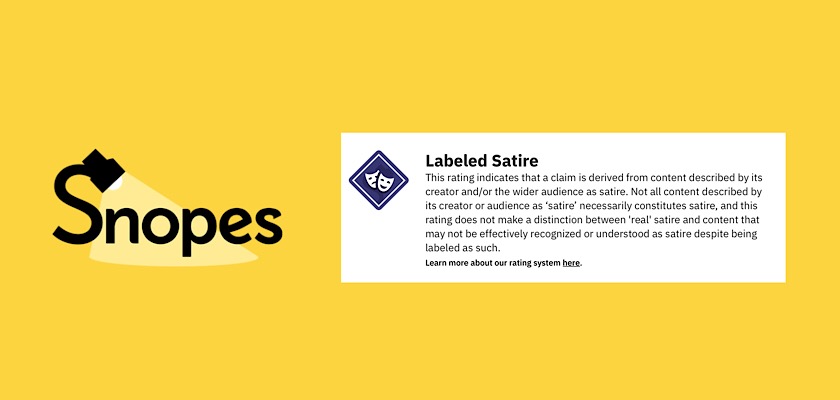“Fact-checker” Snopes has introduced a new “Labeled Satire” rating less than a month after it faced criticism for its “fact-check” of popular satire website, The Babylon Bee. However, this new “Labeled Satire” rating is now facing fresh criticism for suggesting that content with this rating may not be “real satire.”
The criticism comes amid wider concerns that the ratings from “fact-checking” organizations such as Snopes are often used by tech giants when deciding which content to promote and which content to suppress or demonetize.
Snopes has been criticized for “fact-checking” satirical content for some time but it all came to a head when The Babylon Bee’s owner Adam Ford called out Snopes’ “fact-check” of an article from The Babylon Bee which satirized Georgia lawmaker Erica Thomas’s claims that she was told to go back to her country during a grocery store dispute. Ford described this “fact-check” as “an opinion piece” and “a hit piece” and also accused Snopes of treating other satirical sites such as The Onion more favorably.
Ford then doubled down on his criticisms of Snopes in a message to readers of The Babylon Bee and informed them that the site had retained a law firm, saying:
“Snopes appears to be actively engaged in an effort to discredit and deplatform us. While we wish it wasn’t necessary, we have retained a law firm to represent us in this matter.”
Shortly after Ford posted this message, Snopes updated its “fact-check” of The Babylon Bee article (archive link) and added the following “Editors’ Note”:
“Some readers interpreted wording in a previous version of this fact check as imputing deceptive intent on the part of Babylon Bee in its original satirical piece about Georgia state Rep. Erica Thomas, and that was not the editors’ aim. To address any confusion, we have revised some of the wording mostly for tone and clarity. We are in the process of pioneering industry standards for how the fact-checking industry should best address humor and satire.”
Now in the latest update related to this “fact-check” of The Babylon Bee article, Snopes has replaced the original “False” rating with this new and recently introduced “Labeled Satire” rating.
In its description of the “Labeled Satire” rating, Snopes doesn’t definitively say whether content with this label is actually satire and instead uses the following vague description:
“Not all content described by its creator or audience as ‘satire’ necessarily constitutes satire, and this rating does not make a distinction between ‘real’ satire and content that may not be effectively recognized or understood as satire despite being labeled as such.”
This “Labeled Satire” rating is now drawing fresh criticism with The Babylon Bee’s editor-in-chief Kyle Mann pointing out that it insinuates that content with this label “may still fall under some kind of nebulous “satire but not really“ category.”
Click here to display content from X.
Learn more in X’s privacy policy.
Mann adds that while this rating can be useful for sites that intentionally distribute fake news and “slap “satire” on the description to avoid lawsuits,” it’s not as useful when applied to satirical sites like The Babylon Bee and allows Snopes to label such sites as “supposed satire.”
Click here to display content from X.
Learn more in X’s privacy policy.
The Babylon Bee expanded on Mann’s point by saying that “satire is distinguished from fake news by intent, not by labels or reaction” and added that it’s clear that sites like The Onion and The Babylon Bee are intentionally satirical.
Click here to display content from X.
Learn more in X’s privacy policy.
Other people have also pointed out how the rating is “unbelievably stupid.”
Click here to display content from X.
Learn more in X’s privacy policy.
Click here to display content from X.
Learn more in X’s privacy policy.
This isn’t the first time Snopes’ has faced scrutiny over its “fact-checks.” Multiple proven facts have previously been given an “Unproven” or “Mixture” rating by this “fact-checking” site.
While Snopes’ opinion on satire and facts may seem relatively inconsequential, ratings like these do have a deeper impact on content distribution for sites that are “fact-checked.” Facebook previously threatened to limit distribution and demonetize The Babylon Bee based on a Snopes “fact-check” and temporarily showed people viewing this post a warning message before apologizing and removing this warning message.
Click here to display content from X.
Learn more in X’s privacy policy.
Facebook has also made similar threats to other Facebook groups, started “fact-checking” memes on Instagram, and even introduced some “fact-checking” tools into the encrypted messaging app WhatsApp.
And it’s not just Facebook. YouTube “fact-checks” some of its search results and presents users with “information panels” which often dissuade viewers from watching certain videos.













